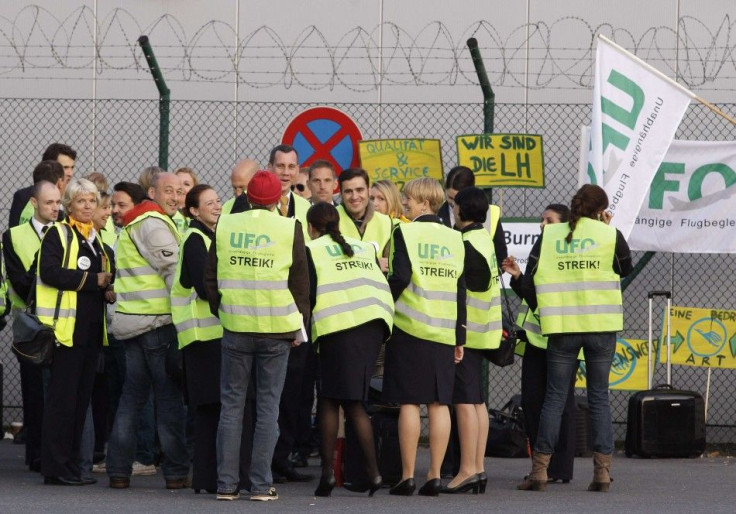Lufthansa Strike To Continue, Escalate Friday

The Lufthansa strike was far from over when cabin crew returned to work Tuesday. Far from it, the UFO union said late Tuesday it would up the stakes by initiating a 24-hour strike throughout Germany this Friday -- a sign that the ongoing row over pay and conditions could drag on for weeks, stranding thousands and costing the carrier tens of millions of euros.
Lufthansa, Europe's largest airline by passenger numbers, operates in 16 German airports, and Nicoley Baublies, head of the UFO union, said all would be affected in the next walkout, scheduled for midnight Friday morning.
More than 300 flights, or a sixth of all Lufthansa flights, were canceled Tuesday at Germany's three largest airports. The strike followed a similar action last Friday that forced hundreds more cancellations and left some 26,000 passengers stranded.
The UFO union called on cabin crew to strike on Tuesday in Berlin, Frankfurt and Munich. The strikes ended at Berlin Tegal Airport at 1:00 p.m. and Frankfurt Airport at 2:00 p.m. The strike in Munich, meanwhile, is expected to last through midnight local time.
"Lufthansa sincerely regrets that the labor dispute is being waged at the expense of its customers," the airline said in a statement Tuesday. It sent about 18,000 text messages to customers' mobile devices informing them of cancellations, which comprised short- and medium-haul flights, as well as about a third of the carrier's long-haul trips, including flights to Mexico City, Beijing and several U.S. destinations.
Flights on Lufthansa Regional (Air Dolomiti, Augsburg Airways, CityLine, Eurowings) and Germanwings were not affected. Its Austrian Airlines unit, meanwhile, used larger aircraft on routes to Germany Tuesday in an attempt to mitigate delays.
The UFO union seeks 5 percent pay raises for the airline's more than 18,000 cabin crew after several years without increases. It called the first strike on Friday after 13 months of negotiations for higher pay and guarantees that its members would not have to accept cheaper contracts with the carrier's partner budget airlines failed to reach an agreement. Lufthansa has offered 3.5 percent and is trying to cut approximately €1.5 billion ($1.9 billion) from its costs by the beginning of 2015.
Baublies called on Lufthansa to begin mediation Tuesday, a process that could halt the strikes. He has said on numerous occasions that the current walk-offs will only be the start if Lufthansa does not change its tune. He has threatened to strike into the autumn and winter if demands are not met.
Lufthansa, however, has said "the offer already made is reason enough to return to the negotiating table." Jürgen Weber, the head of the supervisory board, told German weekly Die Zeit that it's "better to have a big confrontation now rather than waiting until the company has catapulted itself out of the competition."
Rather than going into arbitration after talks failed, the airline allowed the dispute to escalate further, paving the way for the company's first major industrial action by flight attendants.
Germany has a reputation for amicable labor relations when compared to its European neighbors; however, its airlines have struggled to cope with new taxes, the rise in low-cost carriers, soaring fuel prices and fast-growing competitors like Emirates, Qatar Airways and Etihad Airways. Lufthansa's profits declined by 24 percent in the second-quarter, compared with a year ago, and attempts to cut costs have led to numerous disputes.
Analysts estimate that the strikes so far have cost the carrier between €5 million and €10 million, but Equinet analyst Jochen Rothenbacher said that figure could jump as high as €50 million if the proposed 24-hour nationwide strike goes off as planned on Friday.
© Copyright IBTimes 2024. All rights reserved.






















